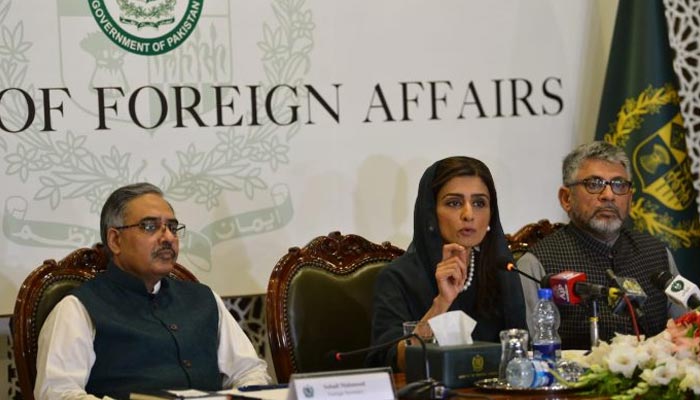No backchannel diplomacy going on with India: Khar
ISLAMABAD: Minister of State for Foreign Affairs Hina Rabbani Khar Thursday told the Senate that no backchannel diplomacy was under way between Pakistan and India but it was going on during the PTI’s tenure. It was unclear whether or not the-then government knew about it.
During the Question-Hour, the minister said, “Ever since the incumbent government came to power, there has been no back channel diplomacy.” However, she maintained that there was no harm in the back channel diplomacy if it was result-oriented.
Replying to a question, the minister explained that Pakistan entered into two agreements with India after August 5 during the PTI government’s tenure.
Khar contended that presently bilateral diplomatic relations were limited and people-to-people exchanges were at a minimal level. Despite the current difficulties in the relationship, two agreements have been signed during the last four years, she added.
She said in line with Pakistan’s abiding commitment to facilitate religious harmony and building interfaith relations, Pakistan signed a Memorandum of Understanding (MoU) with India to open the Kartarpur Corridor on October 24, 2019. The corridor was termed the ‘Corridor of Peace’ by the UN Secretary General Antonio Guterres. Nearly 5,000 pilgrims are now able to visit the holy site on a daily basis, without the need for visa. The corridor was inaugurated on November 9, 2019.
The minister noted another significant bilateral understanding is the Directors General of Military Operations (DGMO) understanding of February 2021. The understanding was announced on February 25, 2021 through a joint statement issued after consultations between the DGMOs of both Pakistan and India.
Discussions were held over the established mechanism of hotline contact. Before this understanding was entered into, the two countries had a previous ceasefire understanding in 2003 which was violated by India 13,500 times, leading to the death of 310 citizens and injuring at least 1,600.
“While Pakistan always took initiatives to promote peace, the Indian cross-border hostility is of a unique type and the BBC documentary on Modi has shown the world why we have taken this position. Pakistan has learnt from history but some countries in the region have not.”
She continued oftentimes, on international forums, Pakistan was asked to normalise its ties with India. “To them, our response is that they should look at the messages we have received from India. The messages that we are getting are all conflagratory. Pakistan has the largest interest in unleashing [the potential of] this region but what when a government on the other side whose prime minister says that their nuclear assets are not for Diwali,” she regretted.
However, despite New Delhi’s negative attitude, she pointed out, Islamabad would continue on the path of peace, and tension between the two on the Line of Control had decreased.
To a calling attention notice on economy, Minister of State for Finance Aisha Ghaus Pasha said the government had a plan to improve the ongoing economic situation and it was determined to protect the poor segments of the society. The minister said the government inherited a difficult economic situation and devastating floods and international factors negatively impacted it. She added that all the political parties should stand united while rising above political interest to steer the country out of the economic quagmire.
-
 Fresh Details Of King Charles, Queen Camilla's US Visit Emerge Amid Andrew Investigation
Fresh Details Of King Charles, Queen Camilla's US Visit Emerge Amid Andrew Investigation -
 Iran 'set To Buy' Chinese Carrier-killer Missiles As US Forces Gather In Region
Iran 'set To Buy' Chinese Carrier-killer Missiles As US Forces Gather In Region -
 Prince Harry And Meghan Unlikely To Meet Royals In Jordan
Prince Harry And Meghan Unlikely To Meet Royals In Jordan -
 Hero Fiennes Tiffin Shares Life-changing Advice He Received From Henry Cavill
Hero Fiennes Tiffin Shares Life-changing Advice He Received From Henry Cavill -
 Savannah Guthrie's Fans Receive Disappointing News
Savannah Guthrie's Fans Receive Disappointing News -
 Prince William Steps Out For First Solo Outing After Andrew's Arrest
Prince William Steps Out For First Solo Outing After Andrew's Arrest -
 Jake Paul Chooses Silence As Van Damme Once Again Challenges Him To Fight
Jake Paul Chooses Silence As Van Damme Once Again Challenges Him To Fight -
 Google Disrupts Chinese-linked Hacking Groups Behind Global Cyber Attacks
Google Disrupts Chinese-linked Hacking Groups Behind Global Cyber Attacks -
 Four People Killed In Stabbing Rampage At Washington Home
Four People Killed In Stabbing Rampage At Washington Home -
 Meghan Pushes Prince Harry Into Territory That’s Dangerous To His Brand: ‘She Isn’t Hearing A Word Of It’
Meghan Pushes Prince Harry Into Territory That’s Dangerous To His Brand: ‘She Isn’t Hearing A Word Of It’ -
 Christina Applegate Reflects On Lasting Impact Of Being Molested In Childhood
Christina Applegate Reflects On Lasting Impact Of Being Molested In Childhood -
 Martin Short Makes Big Decision Following Tragic Death Of Daughter
Martin Short Makes Big Decision Following Tragic Death Of Daughter -
 Antarctica’s Mysterious ‘gravity Hole’: What’s Behind The Evolution Of Earth’s Deep Interior?
Antarctica’s Mysterious ‘gravity Hole’: What’s Behind The Evolution Of Earth’s Deep Interior? -
 Hilary Duff Addresses Ashley Tisdale's 'toxic Mom Group' Claims And Matthew Koma's Firey Response
Hilary Duff Addresses Ashley Tisdale's 'toxic Mom Group' Claims And Matthew Koma's Firey Response -
 Jack Hughes's Proximity To Trump Angers Tate McRae Fans
Jack Hughes's Proximity To Trump Angers Tate McRae Fans -
 Neve Campbell Opens Up About Her 'difficult Decision' To Not Sign 'Scream 6'
Neve Campbell Opens Up About Her 'difficult Decision' To Not Sign 'Scream 6'




